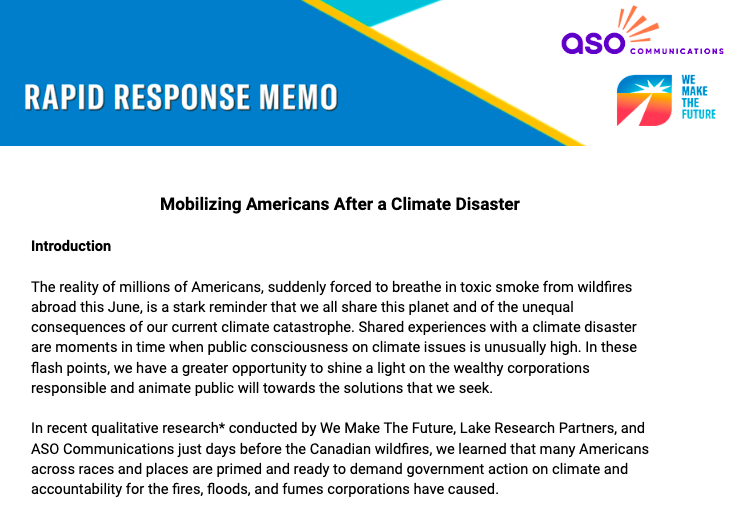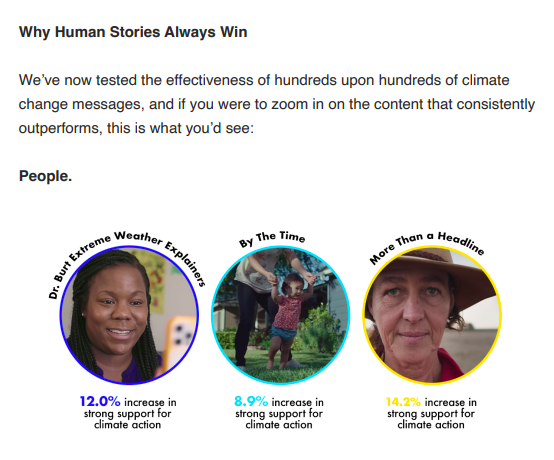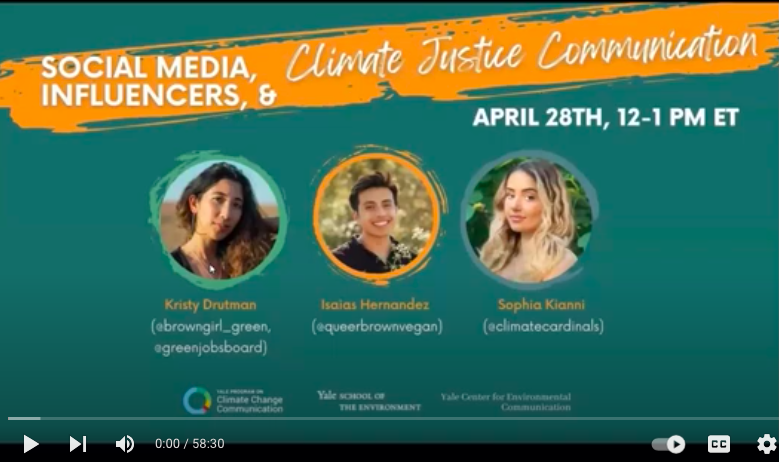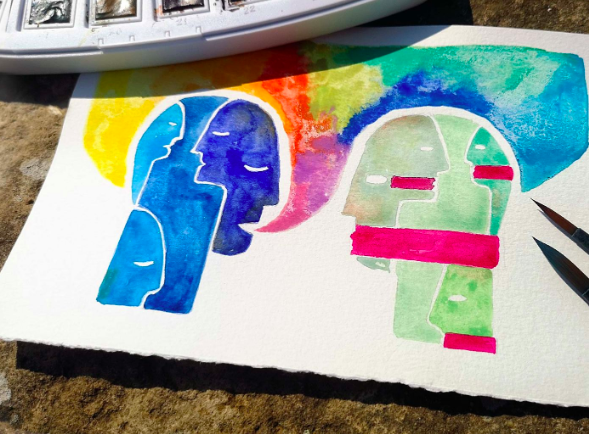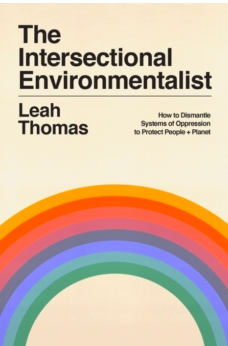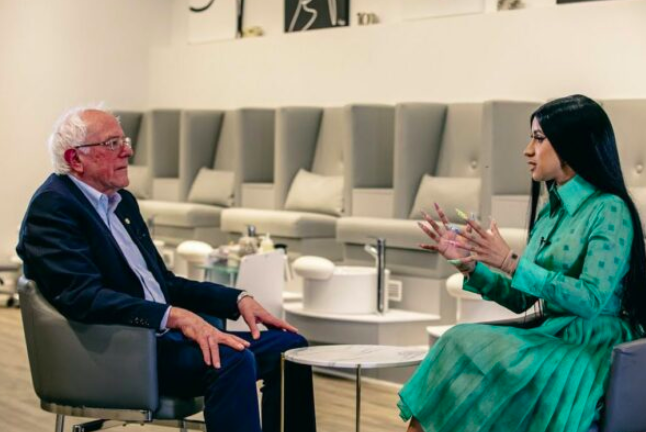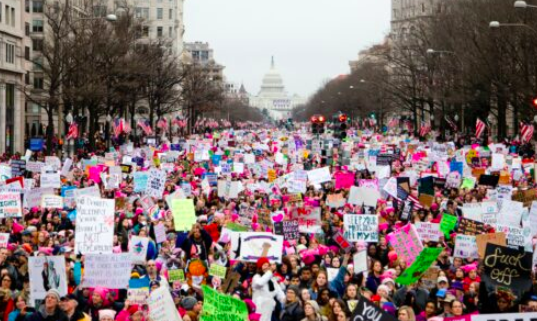Resources
Search below for resources covering the intersection of climate engagement, social science and data analytics.
RESULTS
Mobilizing Americans After a Climate Disaster
Campaigners, communicators, and community leaders can use the following guidance to mobilize and move our base and persuadable audiences to call out for action and leadership that will protect our climate, our families and our futures. To make effective calls for action, people need a clear sense that we cannot merely survive but we can actually confront our problems in order to live better lives. Combine calls to action, such as holding fossil fuel corporations accountable in the aftermath of these events, with a vision for the better future we will create. It’s critical that we make it clear who is at fault for the disasters that we are facing – the wealthy corporations, Big Oil, fossil fuel CEOs and the politicians they pay for who want to keep hoarding our wealth, blocking the policies we want and need, and refusing to pay for the damage they’ve done to our lives and the places we call home. For overall best messaging practices, lead with values, naming that they’re shared across races, classes and backgrounds. Name the culprits behind this crisis and ascribe motivations behind their actions to perpetuate harm and block solutions. Combat cynicism by highlighting past and recent victories we’ve achieved by coming together. And make clear our desired destination by connecting action in the present with our vision for the future.
Can Americans Talk About Their History Without False Antagonism?
Americans think they disagree about their national history more than they actually do. Republicans think Democrats want to teach a history exclusively defined by shameful oppression and guilt, while Democrats believe Republicans want to overlook grave injustices like slavery and racism—yet both impressions are incorrect. For example, the proportion of Republicans who agree that “Martin Luther King and Rosa Parks should be taught as examples of Americans who fought for equality” is more than two times more than Democrats think (93% versus 35%). In another example, about twice as many Democrats believe “students should not be made to feel guilty or personally responsible for the errors of prior generations” than Republicans think (83% versus 43%). How can we close that perception gap? First, correcting misperceptions can reduce perception gaps. Second, we can all personally do our best to reduce our own perception gaps. Third, enter into dialogue with someone with a different political viewpoint. Fourth, help build an alternative social network ecosystem of people with a variety of viewpoints.
Why Human Stories Always Win
Messages that consistently outperform other content center people and their stories. Again and again, whether the topic was jobs, extreme weather, or the scientific facts of overheating, one finding seemed to stand head and shoulders above the rest: Advertisements with human faces win. A natural, casual conversation between two moms—one a climate scientist, and one an everyday American who had some questions about how (and why) wildfires were getting worse—increased strong support for immediate climate action by 12.0%, compared to a provocative ad that highlighted the constant “state of emergency” we often find ourselves in due to extreme weather, which increased strong support by 3.4%. Another recent campaign specific to California showcased the individual humans most affected by the headlines many have become immune to: A headline about a drought is easy to ignore, but the face of a farmer is hard to forget—this campaign led to a 14.2% increase in strong support for climate action. Overall, find the humans, humanize the headlines, connect on shared values, and lift up unexpected messengers.
Social Media, Influencers, and Climate Justice Communication
Leading eco-influencers are harnessing online platforms for education and social change around environmental, climate, and justice issues. Kristy Drutman of Browngirl Green and Green Jobs Board is working to improve the anti-racist practices of environmental organizations and publicly speaks on climate justice. Isaias Hernandez of QueerBrownVegan creates online educational climate content and collaborates with writers, communicators and researchers. Sophia Kianni of Climate Cardinals is working to make the climate movement more accessible by translating and sourcing crucial climate resources into more than 100 languages.
Pushing for Energy Justice with Fairbanks Climate Action Coalition: Community Organizing Lessons from Alaska
The Fairbanks Climate Action Coalition (FCAC) is working to advance a Just Transition away from fossil fuel extraction and towards renewable energy and a regenerative economy in interior Alaska. For several years, FCAC’s Renewable Energy Working Group has been organizing around their local electric utility cooperative, Golden Valley Electric Association (GVEA), to support more generation from renewable energy sources and energy justice initiatives and decarbonization of electricity. FCAC’s organizing efforts have supported more pro-renewable candidates to be democratically elected to the GVEA’s Board of Directors and pushed the utility to consider community solar projects and on-bill financing. A major win came in June 2022 when the GVEA Board adopted a strategic generation plan including a commitment to close down one of their coal plants and pursue a large scale wind power project.
In this webinar, FCAC shares learnings from their Microgrant Report: Cooperative Opportunity: Clean Energy documenting the development of their campaign, sharing reflections on how their organizing structure led to wins, the challenges they faced, and the lessons that can be learned to succeed in future campaigns.
Exploring narrative practices for broad-based movements in contexts of democratic decline
There are key ways for movement groups to use narrative strategies to build stronger coalitions. Many narrative practitioners and funders are using creative means to build narrative infrastructure and power, especially for those whose voices have been traditionally marginalized or “othered.” Yet, we continue to experience fragmentation and toxic othering within many of our movement ecologies where civic space is closing. Here are three areas of narrative practice that support collaboration between groups coming together with the aim of reducing systems of authoritarianism and strengthening democratic values: 1) Legitimacy—how narratives regulate and determine the nature of interactions between people, 2) Power—the dynamics of relations and decision-making in the narrative landscape, 3) Complexity—the capacity of any narrative to evolve and change. The Narrative Engagement Across Difference Project (NEAD) was designed by a consortium of organizers, academics, and philanthropists to take a deep look at narrative practices from a multidisciplinary lens and to reflect on how we can better unlock more effective collective action within diverse, broad-based movements.
Using Radical Re-Imagination to Create a Vision for Our Future
Stories like Wakanda Forever demonstrate the level of violence that colonization, conquest, and genocide have caused throughout generations—and how we can overcome them. When we think about the future of technology and social innovation, we need to do so through an alternative lens, just like in Wakanda Forever, and believe in a future where everyone has the talent, vision, and access to build projects that are sustainable and beneficial to all. We need to visualize a world rooted in abundance that rejects the idea that Blackness and Indigeneity must continue to be considered nonexistent in the Americas. Creating a new vision is just the start. We also must ask ourselves what this fictional speculation about our futures means for us today, especially those of us in positions to influence philanthropic resources for communities of color. It is our responsibility to be proactive about centering those intersecting narratives and debunk the myth that innovation and creativity come only from those who can access or understand the latest technology or benefit from proximity to centers of innovation and power.
#BlackClimateWeek Reading List 2023
Black authors have told stories of the origins and consequences of environmental injustices, given us the richest and most comprehensive collection of poems about nature, and reimagined the future. The Solutions Project is excited to share recommendations to add to your reading list in February and all of the other months of the year. Readings include “The Intersectional Environmentalist” by Leah Thomas, “Black Joy: Stories of Resistance, Resilience, and Restoration” by Tracey Micha’el Lewis-Giggetts, “Becoming Abolitionists” by Derecka Purnell, “An Abolitionist’s Handbook” by Patrisse Cullors, and “Madam C.J. Walker’s Gospel of Giving” by Tyrone McKinley Freeman.
Harnessing the enormous untapped power of celebrity to help social movements
Building on the long legacy of activist entertainers, here are five ways movements for justice and famous supporters can partner to promote change. First, celebrities and movements can make better political endorsements together: they can look to social justice organizations for guidance as to which candidates have listened to them and committed to processes to govern in the best interest of their communities. Second, celebrities can amplify trigger events, which can draw people with no prior interest or experience in politics into mass protests. Third, celebrities can boost organizing campaigns, especially at pivotal campaign junctures. Fourth, celebrities can expand the Overton window by lending their support to causes and movements that exist outside of current norms, and thereby work to expand the bounds of public acceptance. Fifth, they can fuel boycotts by putting extra pressure on corporations.
What determines the success of movements today?
New research from the Social Change Lab offers key insights into the three main factors that lead to protest wins. First, nonviolent tactics are more likely to lead to successful outcomes relative to violent outcomes—experts consulted were reasonably confident that violence is a less effective approach and the literature supported their view. Second, size of protests is really key, with better-attended protests meaning a higher chance of policy changes and other desired outcomes. Third, favorable sociopolitical context like pre-existing public opinion, the response of the media, whether there are elites (like politicians or celebrities) who support the cause, as well as blind luck are helpful for facilitating successful political outcomes.
Pagination
- Previous page
- Page 3
- Next page
